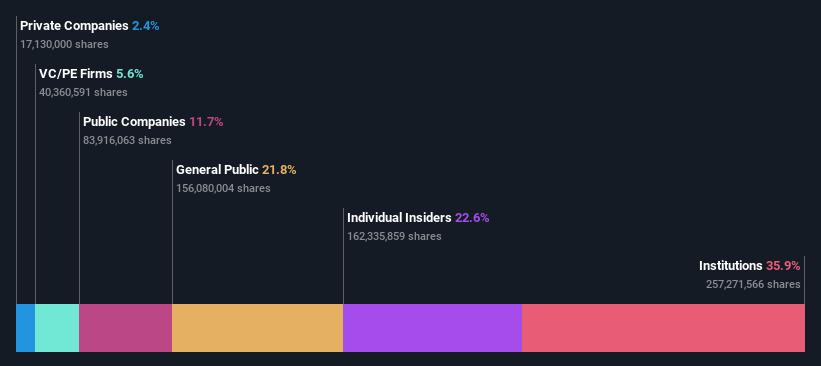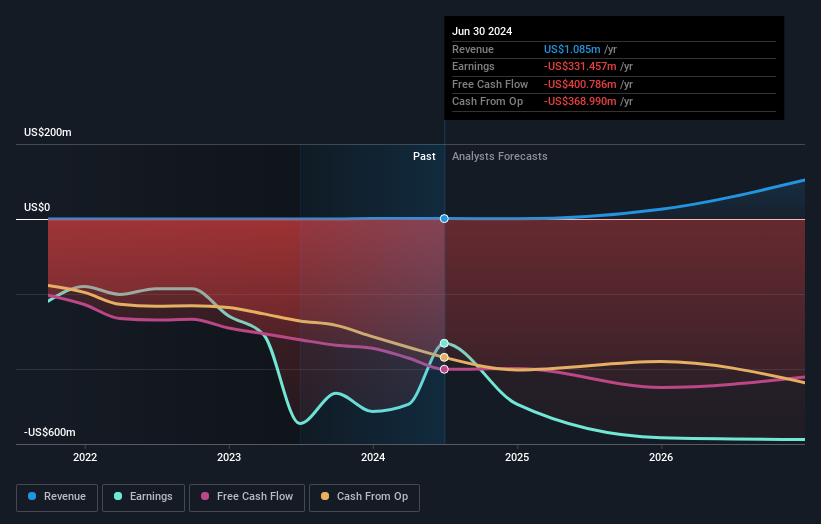- United States
- /
- Airlines
- /
- NYSE:JOBY
Joby Aviation, Inc.'s (NYSE:JOBY) recent 4.4% pullback adds to one-year year losses, institutional owners may take drastic measures

Key Insights
- Significantly high institutional ownership implies Joby Aviation's stock price is sensitive to their trading actions
- The top 6 shareholders own 50% of the company
- Insiders own 23% of Joby Aviation
Every investor in Joby Aviation, Inc. (NYSE:JOBY) should be aware of the most powerful shareholder groups. With 36% stake, institutions possess the maximum shares in the company. That is, the group stands to benefit the most if the stock rises (or lose the most if there is a downturn).
As a result, institutional investors endured the highest losses last week after market cap fell by US$179m. Needless to say, the recent loss which further adds to the one-year loss to shareholders of 15% might not go down well especially with this category of shareholders. Also referred to as "smart money", institutions have a lot of sway over how a stock's price moves. As a result, if the decline continues, institutional investors may be pressured to sell Joby Aviation which might hurt individual investors.
Let's delve deeper into each type of owner of Joby Aviation, beginning with the chart below.
See our latest analysis for Joby Aviation

What Does The Institutional Ownership Tell Us About Joby Aviation?
Many institutions measure their performance against an index that approximates the local market. So they usually pay more attention to companies that are included in major indices.
We can see that Joby Aviation does have institutional investors; and they hold a good portion of the company's stock. This suggests some credibility amongst professional investors. But we can't rely on that fact alone since institutions make bad investments sometimes, just like everyone does. If multiple institutions change their view on a stock at the same time, you could see the share price drop fast. It's therefore worth looking at Joby Aviation's earnings history below. Of course, the future is what really matters.

Joby Aviation is not owned by hedge funds. The company's CEO JoeBen Bevirt is the largest shareholder with 13% of shares outstanding. With 10% and 8.4% of the shares outstanding respectively, Toyota Motor Corporation and Paul Sciarra are the second and third largest shareholders. Interestingly, the third-largest shareholder, Paul Sciarra is also a Chairman of the Board, again, indicating strong insider ownership amongst the company's top shareholders.
We did some more digging and found that 6 of the top shareholders account for roughly 50% of the register, implying that along with larger shareholders, there are a few smaller shareholders, thereby balancing out each others interests somewhat.
Researching institutional ownership is a good way to gauge and filter a stock's expected performance. The same can be achieved by studying analyst sentiments. Quite a few analysts cover the stock, so you could look into forecast growth quite easily.
Insider Ownership Of Joby Aviation
The definition of company insiders can be subjective and does vary between jurisdictions. Our data reflects individual insiders, capturing board members at the very least. Company management run the business, but the CEO will answer to the board, even if he or she is a member of it.
Most consider insider ownership a positive because it can indicate the board is well aligned with other shareholders. However, on some occasions too much power is concentrated within this group.
Our most recent data indicates that insiders own a reasonable proportion of Joby Aviation, Inc.. Insiders own US$880m worth of shares in the US$3.9b company. That's quite meaningful. It is good to see this level of investment. You can check here to see if those insiders have been buying recently.
General Public Ownership
The general public-- including retail investors -- own 22% stake in the company, and hence can't easily be ignored. While this size of ownership may not be enough to sway a policy decision in their favour, they can still make a collective impact on company policies.
Private Equity Ownership
Private equity firms hold a 5.6% stake in Joby Aviation. This suggests they can be influential in key policy decisions. Sometimes we see private equity stick around for the long term, but generally speaking they have a shorter investment horizon and -- as the name suggests -- don't invest in public companies much. After some time they may look to sell and redeploy capital elsewhere.
Public Company Ownership
Public companies currently own 12% of Joby Aviation stock. It's hard to say for sure but this suggests they have entwined business interests. This might be a strategic stake, so it's worth watching this space for changes in ownership.
Next Steps:
While it is well worth considering the different groups that own a company, there are other factors that are even more important. For instance, we've identified 5 warning signs for Joby Aviation (1 is a bit unpleasant) that you should be aware of.
If you are like me, you may want to think about whether this company will grow or shrink. Luckily, you can check this free report showing analyst forecasts for its future.
NB: Figures in this article are calculated using data from the last twelve months, which refer to the 12-month period ending on the last date of the month the financial statement is dated. This may not be consistent with full year annual report figures.
New: Manage All Your Stock Portfolios in One Place
We've created the ultimate portfolio companion for stock investors, and it's free.
• Connect an unlimited number of Portfolios and see your total in one currency
• Be alerted to new Warning Signs or Risks via email or mobile
• Track the Fair Value of your stocks
Have feedback on this article? Concerned about the content? Get in touch with us directly. Alternatively, email editorial-team (at) simplywallst.com.
This article by Simply Wall St is general in nature. We provide commentary based on historical data and analyst forecasts only using an unbiased methodology and our articles are not intended to be financial advice. It does not constitute a recommendation to buy or sell any stock, and does not take account of your objectives, or your financial situation. We aim to bring you long-term focused analysis driven by fundamental data. Note that our analysis may not factor in the latest price-sensitive company announcements or qualitative material. Simply Wall St has no position in any stocks mentioned.
About NYSE:JOBY
Joby Aviation
A vertically integrated air mobility company, engages in building an electric vertical takeoff and landing aircraft optimized to deliver air transportation as a service.
Flawless balance sheet moderate.

